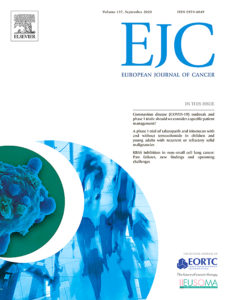PUBLICATION:
European Journal of Cancer
AUTHORS:
Valesca P. Retel, Danalyn Byng, Sabine C. Linn, Katarzyna Jozwiak, Hendrik Koffijberg, Emiel J. Rutgers, Fatima Cardoso, Martine J. Piccart, Coralie Poncet, Laura J. van ’t Veer, Wim H. van Harten.
Abstract:
The clinical utility of the 70-gene signature (MammaPrint®) to guide chemotherapy use in T1-3N0-1M0 breast cancer was demonstrated in the Microarray in Node-Negative and 1 to 3 Positive Lymph Node Disease May Avoid Chemotherapy (MINDACT) study. One thousand four ninety seven of 3356 (46.2%) enrolled patients with high clinical risk (in accordance with the modified Adjuvant! Online clinical-pathological assessment) had a low-risk 70-gene signature. Using patient-level data from the MINDACT trial, the cost-effectiveness of using the 70-gene signature to guide adjuvant chemotherapy selection for clinical high risk, estrogen receptor positive (ER+), human epidermal growth factor 2 negative (HER2-) patients was analysed.
Patients and methods
A hybrid decision tree-Markov model simulated treatment strategies in accordance with the 70-gene signature with clinical assessment versus clinical assessment alone, over a 10-year time horizon. Primary outcomes were quality-adjusted life years (QALYs), country-specific costs and incremental cost-effectiveness ratios (ICERs) for six countries: Belgium, France, Germany, Netherlands, UK and the US.
Results
Treatment strategies guided by the 70-gene signature result in more QALYs compared with clinical assessment alone. Costs of the 70-gene signature strategy were lower in five of six countries. This led to dominance of the 70-gene signature in Belgium, France, Germany, Netherlands and the US and to a cost-effective situation in the UK (ICER £22,910/QALY). Annual national cost savings were €4.2M (Belgium), €24.7M (France), €45.1M (Germany), €12.7M (Netherlands) and $244M (US). UK budget increase was £8.4M.
Conclusion
Using the 70-gene signature to safely guide chemotherapy de-escalation in clinical high risk patients with ER+/HER2- tumours is cost-effective compared with using clinical assessment alone. Long-term follow-up and outcomes from the MINDACT trial are necessary to address uncertainties in model inputs.



